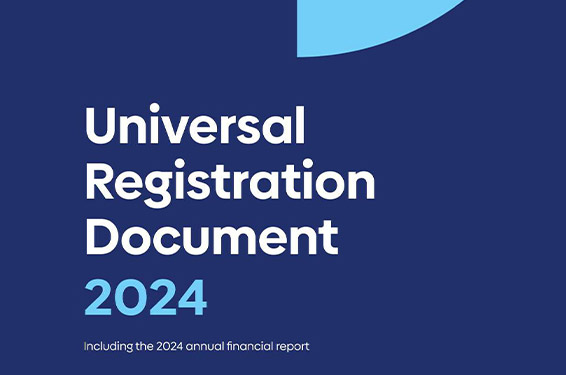Atos strives to be an environmental leader in the digital sector by setting ambitious decarbonization targets
Atos’ current commitment is to reduce its absolute Greenhouse gas emissions by 50% by 2025 (All GHG Protocol Scopes 1, 2 and 3 ; in CO2e ; 2019 base year). This ambitious near-term target was validated by the Science-Based Target initiative (SBTi) in 2020.
Based on policies (notably the environmental policy), processes, guidelines and action plans underpinned by the Environmental Management System (EMS), Atos is organized to achieve the emission reductions and energy efficiency needed to fight climate change.
- Atos total CO2e emissions have decreased by -46% between 2019 and 2024, a trend that is in line with its SBTi near-term reduction target.
- In 2024, 56% of the energy consumed by Atos worldwide came from renewable sources.
- The energy consumption of Atos data centers and offices, in 2024, decreased by -17% compared to 2023.
- Thanks to a global Environmental Management System (EMS), at the end of 2024, 92% of Atos’ main sites were certified or in the process of being certified.
- Three Atos data centers in the UK and Germany have been recognized for their exemplary energy efficiency by the Data Centers European Code of Conduct Awards 2023.
- 3 of the top 10 most energy-efficient supercomputers worldwide were manufactured by Atos (Green 500 ranking as of November 2024).
Following the achievement of the current near-term target, Atos is committed to further its decarbonization commitments.
- Atos will reduce by 36% its absolute Greenhouse gas emissions (All GHG Protocol Scopes 1, 2 and 3 ; in CO2e) by 2035 from a 2025 base year (short term target).
- Atos will also reduce by 90% its absolute Greenhouse gas emissions (All GHG Protocol Scopes 1, 2 and 3 ; in CO2e) by 2050 from a 2025 base year and neutralize its residual emissions (long term and net-zero target).
These new short, long and net-zero targets will be submitted to the SBTi for validation as soon as the 2025 baseline is available. These targets have been set based on the current applicable SBTi Corporate Net-Zero Standard Criteria.
Our environmental journey
Our environmental program is focused on reducing the environmental impacts of our activities based on environmental awareness and empowerment of our employees. With a solid plan addressing Atos material challenge, especially reducing carbon emissions, reducing & optimizing energy/travel, and if relevant, developing Green IT and IT for Green offers, the Atos Environmental Program has significantly reduced our carbon footprint, meeting the most demanding scientific objectives of the Science-Based Target initiative (SBTi) to keep global warming at 1.5 °C.
2024
Double-materiality assessment confirms “Climate Change” and adds “Circular Economy” and “Waste” as material topics for Atos.
2023
Atos reports following the EU Taxonomy for sustainable activities and starts preparing for CSRD.
2022
Atos confirms its commitment to reduce its emissions by 50% between 2019 and 2025 aligned to the newest SBT standards.
2020
Atos commits to the 1.5°C SBT by 2025 and to reach Net Zero.
2017
The SBT initiative validates Atos’ carbon intensity target 2050 (-86% versus 2012)
2015
Climate change commitments are made by Atos as part of the Paris Agreement1
2014
All Atos’ main sites must enter the ISO 14001 certification process and get certified
2008
Atos launches its Environmental Program and focuses on climate emergency
1Paris Agreement: the 2015 United Nations Climate Change Conference, when the agreement to set a goal of limiting global warming to “well below 2 °C” compared to pre-industrial levels was signed.





